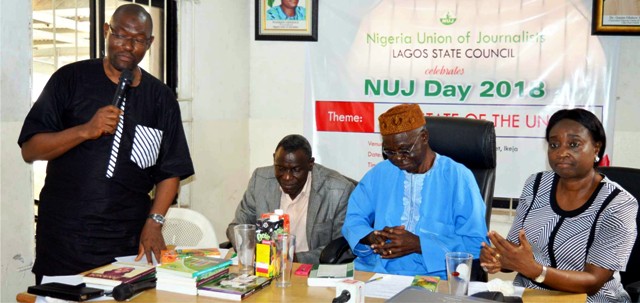Business
Building Industry Operators Fault Land Use Charge

Some operators in the building construction industry have joined in showing dissatisfaction with the level of reduction in the Land Use Charge (LUC) announced by the Lagos State Government.
They spoke with The Tide source in Lagos, Saturday
The state government, following public outcry on its hike in the charge had last Thursday announced various reliefs, with some reduction.
But several groups have continued to express dissatisfaction, adducing various reasons for their positions.
Vice President of the Nigeria Institute of Quantity Surveyors (NIQS), Mr Olayemi Shonubi said last Saturday that the government had not justified the review, which affected only few sections.
According to him, the reduction will make no economic impact if a wholesome amendment is not made to other sections of the law on the charge.
He said this was necessary, considering the requests of the stakeholders, landlords and professionals in the sector.
“Let the entire LUC law be taken back to the House of Assembly for complete overhaul, review and amendment, such that the rate of reduction, penalities removal, installmental payment and conditions may be enacted into the law.
“It is only when the law is wholesomely reviewed to meet with value of the property over time, that it will be of economic importance to the residents of the state.
“Otherwise, the masses will just be living at the mercy of the government because successive governments may come up with different policies in respect to the law at will,” Shonubi said.
Mr Samuel Effiong, former chairman of the Nigerian Institution of Estate Surveyors and Valuers (NIESV) Lagos State Chapter, said that the review of a law as important as the LUC should not be done with a fire brigade approach.
Effiong said that the state government reviewed the charges in haste and as such did not carry out proper analysis, study and consultations.
According to him, the needed fundamental adjustments to the law have not been made.
He said that evaluation of property taxes were not based on capital value, but on income value of the property.
“The government needs not to be in hurry in amending this law.
“They should do the necssary consultations, sit down with the estate surveyors and valuers to properly study/assess the law and work out the modalities for applying it,” Effiong said.
Mr Makinde Ogunleye, former Chairman, Nigeria Institute of Town Planners (NITP), said it would further jeopardise the economic system for the state government to pursue an increment at a time the country just came out of recession.
Ogunleye said it was not the right time for any form of taxation increment.
He said that if the government wants to raise more revenue, it could do so by looking at other areas.
According to him, considering the economic situation in Nigeria today, the government must have sympathy and empathy for the people.
He noted that imposition or addition of any payment of money on citizens now could be exposing them to avoidable pains.
“The state government has so many other ways of generating revenue. Lagos State has a lot of industries.
“Let the state government target the rich and not the poor because increment in LUC will affect everyone; the poor, the average income earner and the rich as well.
“Let them target the extremely rich, the high-end industries, commercial ventures, and not those who are struggling to survive,” Ogunleye said.
The Lagos Government had recently repealed its 2001 Land Use Charge Law and replaced it with a new Land Use Charge Law, 2018, which was signed on Feb. 8.
Business
Kenyan Runners Dominate Berlin Marathons
Kenya made it a clean sweep at the Berlin Marathon with Sabastian Sawe winning the men’s race and Rosemary Wanjiru triumphing in the women’s.
Sawe finished in two hours, two minutes and 16 seconds to make it three wins in his first three marathons.
The 30-year-old, who was victorious at this year’s London Marathon, set a sizzling pace as he left the field behind and ran much of the race surrounded only by his pacesetters.
Japan’s Akasaki Akira came second after a powerful latter half of the race, finishing almost four minutes behind Sawe, while Ethiopia’s Chimdessa Debele followed in third.
“I did my best and I am happy for this performance,” said Sawe.
“I am so happy for this year. I felt well but you cannot change the weather. Next year will be better.”
Sawe had Kelvin Kiptum’s 2023 world record of 2:00:35 in his sights when he reached halfway in 1:00:12, but faded towards the end.
In the women’s race, Wanjiru sped away from the lead pack after 25 kilometers before finishing in 2:21:05.
Ethiopia’s Dera Dida followed three seconds behind Wanjiru, with Azmera Gebru, also of Ethiopia, coming third in 2:21:29.
Wanjiru’s time was 12 minutes slower than compatriot Ruth Chepng’etich’s world record of 2:09:56, which she set in Chicago in 2024.
Business
NIS Ends Decentralised Passport Production After 62 Years
Business
FG To Roll Out Digital Public Infrastructure, Data Exchange, Next Year
-
Sports4 days ago
CAFCL : Rivers United Arrives DR Congo
-
Sports4 days ago
FIFA rankings: S’Eagles drop Position, remain sixth in Africa
-
Sports4 days ago
NPFL club name Iorfa new GM
-
Sports4 days ago
NNL abolishes playoffs for NPFL promotion
-
Sports4 days ago
NSF: Early preparations begin for 2026 National Sports Festival
-
Sports4 days ago
Kwara Hopeful To Host Confed Cup in Ilorin
-
Sports4 days ago
RSG Award Renovation Work At Yakubu Gowon Stadium
-

 Politics4 days ago
Politics4 days agoRivers Assembly Resumes Sitting After Six-Month Suspension

